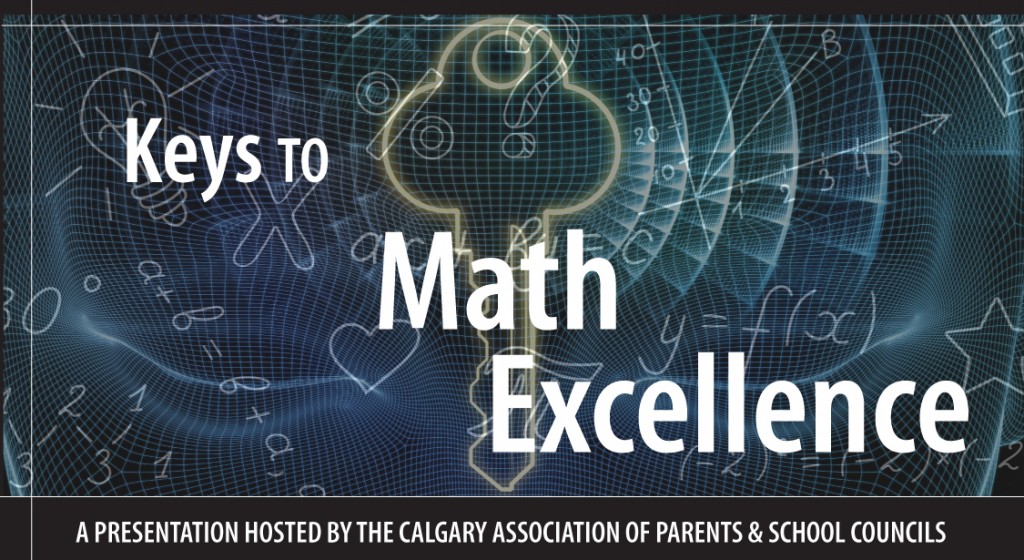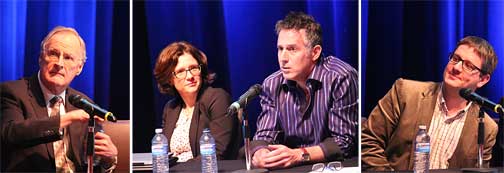 On January 28, CAPSC was pleased to present our Math Excellence Night on behalf of Calgary parents. The intention was to allow parents and other stakeholders in education to glimpse some best practices, and hopefully continue the dialogue in their own community afterward.
On January 28, CAPSC was pleased to present our Math Excellence Night on behalf of Calgary parents. The intention was to allow parents and other stakeholders in education to glimpse some best practices, and hopefully continue the dialogue in their own community afterward.
As discussed that evening, CAPSC invited all school boards and types in Calgary to take part and thanks those who participated. Schools were selected on the basis of high achievement, with the major indicator being strong performance on PAT scores. Diversity and parental choice are one of Alberta’s strengths, and we were interested in hearing from a variety of schools who had achieved strong results.

We thank our speakers for sharing information about best practices in mathematics education. A brief summary appears below for the benefit of those who were unable to attend the presentation.
All of our speakers are passionate about math education. Although they have some differences in how they approach teaching math, they agreed on the following:
- learning the mechanics of math is necessary and important
- direct instruction is valuable
- teachers who excel in this area love the material, and are able to improvise in explaining it to allow students deep understanding
- standardized testing, though imperfect, is a necessary part of ensuring student success.
All expressed concern about standardized testing being removed, believing that we will see a significant reduction in achievement levels.
STUART WACHOWICZ | B.Ed, B.Sc, M.Ed
Previously Director of Curriculum, Edmonton Public Schools | Director of the Confucius Institute, Edmonton
Stuart Wachowicz showed how a population with high English Language Learners and low socio-economic status achieved superior results. He shared results from Youngstown School, in an average Albertan town. Youngstown students achieved a percentage of excellence – almost four times above the provincial standard. Forty-five percent of Grade 6 students achieved excellence compared to 12 percent of students across the province. The Youngstown Model was used to develop curriculum delivery for the Cogito program in Edmonton Public schools, and was the basis for TLC schools in Calgary. It used a direct instruction rather than a child-centered model. Cogito students were not considered privileged. Thirty-five percent were English Language Learners, and 40 percent in a low socio-economic category. Many were children of immigrant families from Asia and eastern Europe. Again, this program approach delivered exceptional results.
Stuart presented compelling data and is one of several seasoned educators expressing concern about recent curriculum changes that have resulted in reducing math achievement. He reiterated the need for ensuring calculations can be made automatically. As well, he believes in minimizing use of technology for basic computation, using a good printed textbook so that parents can follow and support, and using direct instruction to introduce and explain topics. Stuart expressed concern about removing formal geometry from curriculum. He recommends the JUMP math and Singapore Math Resources, and advises against Math Makes Sense textbooks.
ANNA STOKKE | BSc, MSc and PhD (Math)
| Associate Professor at the University of Winnipeg | cofounder of a non-profit math tutoring program and WISE Math
Anna Stokke is Associate Professor of Mathematics at the University of Winnipeg and co-founder of a non-profit math tutoring program and WISE Math. She says math is relentlessly cumulative, and understanding math is like climbing a ladder. You must do it rung by rung. For example, to master multiplication you must first be fluent with addition. Memorizing times tables and practicing procedures does not interfere with understanding. Understanding is important, but not more than skill. Children can master a math skill or concept if they have the previous knowledge required to learn that skill, they receive clear and straightforward instruction, and they practice the skill. If something in your child’s learning seems off, speak up! Fix the problem before it snowballs.
Dr. Stokke compared results from many countries in assessing successful techniques and had interesting comments about where Alberta is not performing well. She provided several links to resources in her presentation. Dr. Stokke recommends JUMP Math, Singapore Math, and Saxon Math. She advises against Math Makes Sense textbooks. She recommends an 80/20 ratio of direct to indirect instruction, and included some recommended resources. Interested parents or teachers are invited to contact her at [email protected] for more information.
JAY NIVEN | BEd, Masters in Mathematics teaching
NEIL WEBBER | PhD, Mathematics Curriculum
| Webber Academy, Calgary
Mechanics and deep understanding are not conflicting concepts. Jay’s personal preference is to teach mechanical proficiency first, then deeper understanding. Direct instruction doesn’t have to be boring – Jay may choose to begin the lesson with a story, instead of the specific math concept, in order to generate excitement on the topic. Trust that your teachers are professionals and know what must happen to help your child succeed in math, but also hold them accountable. Many metrics can be used to measure school and student performance, and standardized exams should be one of them. For elementary students, Webber uses Everyday Mathematics and Math to the Max, as well as other resources.
AARON RENERT | M.Sc, LL.B
MOSHE RENERT
| The Renert School and Bright Minds, Calgary
Children must be cognitively ready to learn the material. However, once a child is ready to understand the concept, they can learn fast and go deep. The curriculum is only a benchmark, and quite low. Good performance is not achieved through rote memorization only, but is a combination of approaches. A complete understanding of concepts is necessary to master the curriculum. Successful teachers all have rigor. The most skillful educators combine deep understanding and rigor with improvising to allow students to understand. There is concern that if PAT and diploma exams disappear, the results will plummet. The school uses Singapore Math, along with other resources.
Become a member today – it’s free! Congratulations to member A. Hausermann, who won two free tickets and an invitation to the VIP reception preceding the event.
